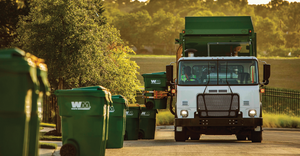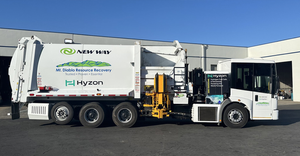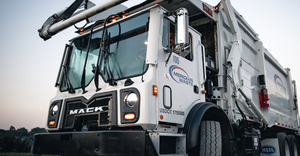Waste, Recycling Industry Can Benefit From Wireless Communications Expo
Here is a look at some of the conference sessions that will be of interest to the waste and recycling industry.

Next week kicks off the 2019 International Wireless Communications Expo (IWCE) at the Las Vegas Convention Center in Las Vegas. The March 4-8 event features an exhibit hall and a five-day comprehensive conference program on technology and trends in critical communications.
“We’re proud to offer the industry’s most comprehensive education program. It’s a powerful resource for industry professionals who are interested in receiving the latest developments, trends and technology in wireless communications,” said Stacey Orlick, IWCE’s director of community and conference content, in a statement. “We have a myriad of sessions that will provide professionals with the broadest spectrum of views, topics and expertise on critical communications.”
More than 7,000 individuals attend from a diverse group of industry professionals, including product distribution, government, public safety, critical infrastructure, business enterprise and more. Several sessions focus on areas of interest to the waste and recycling industry. They include “Getting Your City Ready to Be Smart and Connected,” “Creating Hardened Unified LMR/LTE Communications Solutions for Utilities and Transportation,” and “Alternative PTT and Dispatch Solutions for CI and Enterprise.”
Getting Your City Ready to Be Smart and Connected
What fiber, wireless, broadband, Wi-Fi, 5G and security do cities need before they can start adding smart traffic lights, parking meters, etc.? Connectivity will be key for smart cities, so cities’ understand their options, how they must do this to compete with other cities and how cities recognize they must deploy high-speed broadband and densification for 5G to retain residents and businesses and attract new ones. From privacy concerns to data storage, from Internet of Things (IoT) to 5G to city mapping, from cybersecurity to consumer adoption, from planning to funding, to deployment, attendees can explore how to get their city ready to be smart and connected.
As a speaker for the session, Gary Monetti, founder and managing director of Monetti & Associates Consulting LLC in Edgewater, Md., says before any technology choices are made, a few things need to be done up front.
“Preparation starts with defining the city's priorities and how these priorities can help improve the customer journey and their citizens why of life—less trash in the streets, cleanliness, fewer rodents, better carbon footprint, fewer trucks on the streets, etc.,” he says. “We also need to determine how this investment can help attract new businesses to the city while retaining existing ones. We would need to look at the business case and what operating efficiencies can, to include cost savings, be achieved and where the return on investment is.”
Monetti & Associates provides consulting and engineering services for public safety, federal, commercial and private sectors.
Michael Paddock, CEO of Grants Office in Rochester, N.Y., also will participate as a speaker. He says that by their very nature, most smart cities projects are collaborative.
“Look at any good example, and you’ll find that data sharing and analytics are two pillars of the smart cities architecture. So, coalition building and advanced planning before the project is rolled out will pay big dividends,” he says. “Our session will focus on the grant funding that is available to support a wide range of smart cities projects. We will discuss the federal, state and even private foundation grants that have funded smart cities projects, strategies for thinking about your project from the grantmaker’s standpoint and criteria for determining which grant programs are worth spending the time and resources to pursue.”
Grants Office is a national grants development services firm with a reputation across the public sector as a source of federal, state and foundation grants information and support.
Alexandria, Va.-based company The Digital Decision, whose mission is establishing a nationwide, interoperable communications for the nation’s first responders, will have a representative on the panel with KaeVon LeGrande, project manager of the Verizon TDD Consultant Team for the company. He says that cybersecurity is the number one concern of smart cities.
“If this repository of information is altered or corrupted, the devices and technologies connected can be put in danger,” he says. “In order to better ensure the safety of your IoT and connected systems, cities should invest in policies around IoT data privacy and data usage to restrict misuse; protect individual identities by enforcing credentialing services; protect the source devices; promote a cyber-secure culture by standardizing protocols for accountability; and standardize repercussions for cybercrimes and enforce them, as negative incentives.”
Creating Hardened Unified LMR/LTE Communications Solutions for Utilities and Transportation
Post 2008 recession, the cost associated with deployment of quality Land Mobile Radio (LMR) and Long Term Evolution (LTE) technologies plummeted with the arrival of FirstNET, TETRA and DMR in North America. Fleet operations, whether police, fire, EMT, utilities or transit, are now able to leverage multiple voice and data solutions containing disparate technologies and seamlessly integrate the solutions, providing a unified communications platform that ensures continued connection to mobile workforces regardless of geological events, political unrest, cellular network failures or infrastructure outages. Through redundancy and sensed switching techniques, on both the fixed and mobile environment, hardened voice and data solutions can be created that allow for automatic switching without user intervention.
One of the featured session speakers, Philip Bockrath, vice president of Wireless Technology for Clever Devices based in Woodbury, N.Y., says that utilities and transportation business typically have one of three problems: multiple existing LMR solutions that operate independently across large geographic areas; mid-life LMR solutions, too young to replace but too old—or too expensive to upgrade—to meet their growing needs; or critical operations that require constant contact with their fleet regardless of weather, political or civil problems.
“In all cases, our customers need to support their workforces in ever-expanding service areas with increasingly bandwidth intensive solutions,” he says. “Through patented switching technology, Clever Devices augments LMR with LTE and other broadband solutions to seamlessly switch voice and data communications with up to three voice and/or data paths.”
Clever Devices produces computer aided dispatch/automatic vehicle location solutions (CAD/AVL) and incorporates redundant voice/data communications, automatic passenger counting (APC), automatic vehicle monitoring (AVM), scheduling and reporting into solutions.
Alternative PTT and Dispatch Solutions for CI and Enterprise
Moving from LMR to a cellular-based LTE system is scary for critical infrastructure and even noncritical enterprise. Network reliability, interoperability, coverage, latency and redundancy as well as devices and a migration plan. Even noncritical systems should not fail and, in some cases, cannot fail. Attendees will learn how to keep both their push-to-talk network and dispatch systems operational as they migrate, keeping their workers connected and safe.
Gabriel Brown, product manager for Avtec Inc. in Lexington, S.C., will be a speaker for this session and will discuss the differences between LMR or push-to-talk and LTE or the cellular networks stood up by carrier companies to connect mobile devices.
“The major difference between LMR and LTE networks is traditionally LTE is a one-to-one communication and LMR is an instant communication from one to a group of listeners,” he says. “LMR systems typically are used for first responders and are purposefully build for critical communication during emergency situations.”
Avtec Inc. provides pure internet protocol voice dispatch console solutions for the public safety, business and industry, transportation, energy and government markets.
In addition to the conference program, the exhibit hall will feature more than 400 exhibitors showcasing the latest products and trends in the communications technology industry. A special area of the exhibit hall will host Mission Critical Technologies, featuring applications, wearables, drones, virtual reality and artificial intelligence companies.
Principal Security Architect for Global Accounts for Amazon Web Services (AWS) Merritt Baer will serve as the keynote speaker. In her presentation on March 6, she will provide strategic cloud security guidance to complex, regulated organizations such as the Fortune 200. Additionally, she advises the leadership of AWS’ largest customers on security as a bottom-line proposition.
Waste360 readers can use promo code PRESS for 20 percent off any IWCE conference package, 15 percent off ETA training and free exhibit hall access. The discount code does not apply to single-session tickets or to already discounted government rates.
About the Author
You May Also Like


